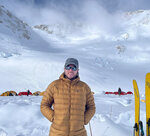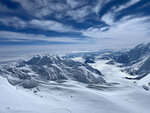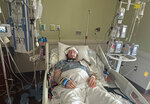


Denali, also referred to as Mount McKinley, is the tallest mountain in North America. Its majestic peak reaches 20,310 feet above sea level. It is in south-central Alaska about 130 miles north-northwest of Anchorage.
Many climbers have stated that reaching the peak of Denali is much more technical and difficult than climbing Mount Everest, the highest mountain in the world.
One Georgia Baptist pastor recently dared to scale the challenging and dangerous summit. Andrew Mineev, pastor of Living Stone Russian Baptist Church in North Atlanta, is a mountain climber with an impressive resume of scaling the highest peaks on the North American Continent.
Mineev has climbed Mt. Shasta (14,179 feet) in Northern California, Mt. Rainier (14,411 feet) in Washington state, and Mt. Whitney (14,505 feet) in California, the tallest peak in the “lower 48” states.
The intrepid pastor knew that climbing Denali would be a terrific challenge and was aware that he needed at least one other experienced “mountaineer” to partner with him in the daunting effort he intended to undertake. He was able to contact a fellow climber in Washington state to accompany him in conquering Denali but discovered on his way to Alaska that the man who agreed to partner with him in this venture decided not to join him in the climb.
Climbing Denali requires not only rope team travel, but advanced glacier skills, heavy load carries, preparedness for unstable and very cold weather, dealing with strong winds, and incredible training. With the absence of a partner, Mineev still felt like he could meet the demands of the challenge before him.
Mineev said, “A small airplane took us from the airport straight to the glacier where I started my journey. It was in the evening when I arrived at the mountain, and there was no reason for me not to begin my climb, because during the summer there is no night (darkness) in Alaska. However, I decided to stay at the first camp overnight and begin my journey up the mountain after a good period of rest."
Mineev recalled being stunned by the silence that first night "There were no birds chirping, no animals howling or growling, no sounds except for an occasional voice," he said.
"The next morning," he continued, "I started out on my journey with a 45-pound backpack and a 65-pound sled with all my food and equipment that I pulled behind me. I had a couple of one-liter bottles that I used to get water from the melting snow. These bottles had special sleeves that were designed to prevent water from freezing, but the water in those bottles was frozen solid by morning even though I placed them in boiling hot water in the evening.”
Although Mineev had 24 hours of sunlight he attempted to move upward during the day, because when the sun went behind the mountain late in the day the temperature dropped drastically even though it was still daylight. He explained that the temperature would fall to 20 degrees below zero and the wind velocity was 60 mph.
“Another reality that challenged my climb,” explained Mineev, “was that there were times when I had to retrace my steps to retrieve the supplies that I could not carry in one trip. There were steep inclines where it was impossible to carry a heavy backpack and drag a sled laden with other supplies behind me. I would carry some of my equipment, clothes and food with me to the next camping area, bury it in the snow, then go back to where I left the other half of my provisions and carry them to that same camping site where I had buried the supplies earlier."
The frequent snow falling was yet another obstacle during Mineev's climb. "Terrific storms causing zero visibility would occur without notice and I would have to stay in my tent for some extra days until the weather improved. At the eleventh camp, where there is a gorge in the Alaska range permitting the clouds to pass through, it seemed to snow from 22-24 hours a day. I was constantly digging my tent out from under the snow.”
Mineev emphasized that the most potentially dangerous hazard in his climb was the multiplicity of crevasses. That was particularly true for him because he was going solo.
“When you have a team of 2, 3, or 5 people you travel roped up.” Mineev explained, “All the members of the team are connected to the rope and if one falls into a crevasse, other members of the team can help rescue the one who falls into an icy cavern. But when you solo, you must rely on yourself only. That’s why I had extra equipment for self-rescue from a crevasse in case of a fall.”
Mineev finally reached the final camp at an altitude of 17,200 feet from sea level. He was only about 4-5 hours from the summit of Denali, but patiently waiting for the abatement of the coldest and most demoralizing weather he had experienced thus far. Once the weather became more favorable, he was ready to make his final push to the top.
Mineev reported, “I was cooking breakfast for myself behind a self-structured snow wall." He had cut snow blocks and built an igloo-like wall around his tent to reduce the wind gusts.
“Suddenly I felt a pain in my back around my kidneys. I turned off my stove off and decided to go and lay down in my tent in hopes that the intense pain would go away."
However, Mineev said, the pain "only worsened. I took painkillers, but they did not help."
Mineev made the decision to call for an evacuation using a small radio that gave him access to the ranger station. "I knew if I contacted the rangers my trip would be over," he said. "But the pain was getting worse, and I decided to end my trip and asked to be evacuated to a place where I could get some help.”
Unfortunately, Mineev was informed that due to the strong winds it would be impossible to evacuate him until the weather was more favorable. The next day, Mineev’s 13th day on the mountain, the helicopter pilots started their rescue mission.
“I learned that it was not possible to land a helicopter in the area where I was located,” Mineev exclaimed, “so they dropped a bin down to where I was. I crawled into the bin and the helicopter took me in the air in that metal stretcher to a lower altitude where they could land at approximately 14,000 feet.”
At that point, Mineev got into the helicopter and was flown to the airport where an emergency vehicle took him to a hospital in Wasilla, Alaska. After a CT scan and a variety of tests, the doctors determined that Mineev had passed a kidney stone. The next day he took a commercial flight back to Atlanta.
Mineev remarked, “When I got home, though I had scheduled an appointment with my physician, I soon began to feel the same excruciating pain I had felt on the mountain. My wife, Oxana, took me to the emergency room of the hospital. After three days in the hospital, one surgeon checked my tests and saw that my kidneys were not working, and the lower intestines were not functioning either."
The medical team scheduled immediate surgery, and found huge blood clots that prevented the blood from flowing into Mineev's kidneys and lower intestine. After surgery, Mineev spent 10 days in the hospital recovering.
“After surgery, a team of doctors started looking for the source of the clots and found a big hole in my heart that was the source of my problems," Mineev said. "However, the doctors had to wait several days to allow me to recover from the previous surgery before repairing the hole in my heart.”
Oxana, Andrew’s wife began to ask their church and others to pray for God’s intervention in what appeared to be a critical health problem. Three days later, the doctors checked on the size of the hole in Andrew’s heart to help, but they could not find the hole and were mystified as to why the surgery seemed to be no longer necessary.
Andrew summarized his experience on the mountain like this: “While suffering from a severe pain on top of the mountain I was praying for my family and asking God to save my life so that I can continue to take care of them. Spiritually, I had great peace in my heart teaching me that we can have assurance from the Scripture that God cares for us and has a great place for us in His Kingdom.
“God showed me that everything is in His hands and He, as a great orchestra director, desires to play a beautiful, eternal symphony in our lives as His precious instruments of grace and love.”